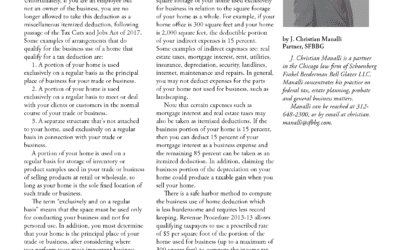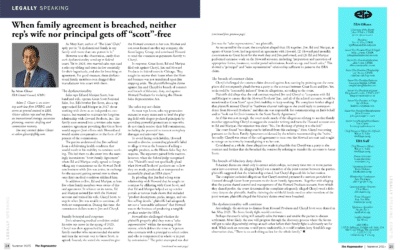Object to the form of the question. While it’s a technically permissible and proper deposition objection, it generally proves of limited utility beyond venting.
Most litigators have, however, encountered at least one opponent who believes in repeating this line after virtually every worthwhile deposition question.
Whether that opponent rigidly interprets Federal Rule of Civil Procedure 32(d)(3)’s waiver rule on depositions or simply desires to disrupt the examination’s flow, many flawless inquiries face baseless form objections.
Now, just in time for the holidays, comes a discovery dispute featuring both deposition abuse and the company that has all but perfected Christmas — Disney. The same entertainment behemoth that produces televised holiday parades down its Main Street and “The Santa Clause” movies finds itself defending a lawsuit involving hundreds of alleged Mickey Mouse deposition
objections.
Michael Smith claimed in federal court in Orlando, Fla., that Walt Disney Parks and Resorts U.S. Inc. committed race and sex discrimination against him and then retaliated against him for complaining about the discrimination. Smith v. Walt Disney Parks and Resorts U.S. Inc., No. 6:13cv1900 (M.D. Fla.).
According to Disney’s attorney, when he deposed Smith and his wife, Donna, the plaintiff’s counsel objected to the form of the question 191 times during Smith’s deposition and another 251 times during Donna Smith’s. Even more surprising, when the Smiths did answer questions, counsel moved to strike his own clients’ testimony some 20 times.
Disney sought relief from the district court. In a motion filed on Dec. 1, Disney outlined various other deposition misconduct it suggested was aimed to impede the flow of questioning and waste the limited time available.
This misconduct of the plaintiff’s counsel allegedly included answering his cellphone while Smith’s wife was under examination; talking to the court reporter during the questioning; accusing Disney’s counsel of asking a question “three or four times” and then directing his client not to answer; and coaching the witness on the record (for instance, “Let me ask you again, Mr. Smith, to just answer the questions. It’s very important because, as you notice between the conversation opposing counsel and I just had, this is a very serious matter to Disney, and so you need to be very careful and listen to what she asks”).
When the Disney attorney asked Donna Smith if she recalled the date her mother died, the witness started to cry. A break was taken. Upon resumption, the witness was asked if the crying was due to her mother’s loss. A lengthy response ensued, and the plaintiff’s counsel then suspended the deposition.
No agreement was reached to resume the remaining 2½ hours of Donna Smith’s deposition, much less with the additional two hours requested by Disney to offset the many interruptions. Disney therefore moved to compel the witness’ return and for the costs of seeking relief, including attorney fees.
The Smiths’ counsel will undoubtedly present a different version of events leading up to the dispute in its response, but the motion to compel is eyecatching for focusing on the combined 442 form of the question objections allegedly interposed in Smith’s deposition and his wife’s abbreviated session. If Disney’s allegations hold up, this abusive discovery practice will likely face its day of reckoning.
By focusing on the number of form objections, however, without challenging their propriety, Disney may have overlooked an increasingly popular judicial avenue directed to controlling deposition misconduct. Recent case law suggests that the quality of deposition objections, not just their quantity, will receive judicial attention.
Although widely used, certain judges don’t much care for naked form objections. Some federal cases decided, just this year make clear that courts are starting to reject the long-standing and often reflexive “object to the form of the question” utterance in depositions when counsel does not also explain the flaw in the question’s form (compound, leading, calls for speculation).
In a dispute featuring at least 115 form objections, U.S. District Judge Mark W. Bennett in Sioux City, Iowa, recently wrote that “objecting to ‘form’ is like objecting to ‘improper’ — it does no more than vaguely suggest that the objector takes issue with the question. It is not itself a ground for objection, nor does it preserve any objection.” The Security National Bank of Sioux City,
Iowa v. Abbott Labs, No. C 114017, (N.D. Iowa, July 28, 2014). Bennett opined that lawyers are required to specify the basis for their form objections.
Chief U.S. District Judge Clay D. Land in Columbus, Ga., likewise found that a form objection “is meaningless standing alone and is contrary to what is contemplated by the Federal Rules of Civil Procedure.” Henderson v. B&B Precast & Pipe LLC, No. 4:13CV528 (M.D. Ga., Aug. 14, 2014).
Those seeking to avoid waiver by asserting form objections may actually have it backward, according to Land. Merely objecting to form, without identifying the flaw, does not preserve the issue because “if a question is propounded in an improper form, the objection should be stated concisely on the record during the deposition in a manner that provides the questioner with a
reasonable opportunity to correct the form of the question. Failure to do so waives the objection.”
U.S. District Judge Nora Barry Fischer in Pittsburgh took a practical approach in overruling form objections that did not specify the problem with the question posed: “Objections to form must sufficiently explain the objection so that the interrogator is able to revise the question and avoid the problem.” Wise v. Washington County, No. 101677 (W.D. Pa., March 7, 2014).
Disney can perhaps be excused for not challenging one of the form objections, much less 442 of them on the sufficiency of the objections. Many district courts persist in prohibiting lawyers from saying more than “objection to form,” finding additional comment comprises an improper speaking objection. See, e.g., Valencia v. City of Santa Fe, No. 12 cv 0137 (D. N.M. 2013) (“it is
improper for counsel to explain his or her objection when such an explanation has not been asked for by opposing counsel”).
Cases demanding more than “objection to the form” will take some time to catch on and appear presently to constitute the exception rather than the rule. Yet, a healthy New Year’s resolution might comprise recognizing that change is coming, and that “objection to form” is so 2014.



